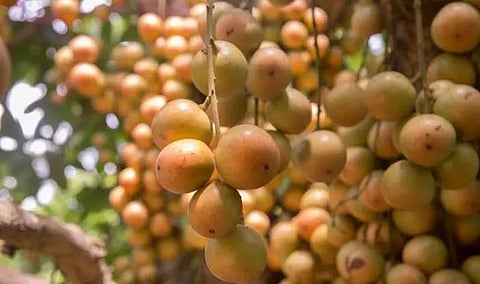
- Home
- Live Blog
- Breaking News
- Top Headlines
- Cities
- NE News
- Sentinel Media
- Sports
- Education
- Jobs

The 'leteku' – a much-neglected minor and underexploited fruit that grows in abundance in Assam villages – has made it to the front page of newspapers in Guwahati on Sunday morning. And, unlike most occasions when anything or anybody attracts headlines for the wrong reasons, the humble 'leteku' was on the front page for a very positive reason. Yes, it is an occasion to rejoice, because our 'leteku' – a fruit, which unlike other seasonal local fruits does not get respectable space in Guwahati's Beltola bazar – not only quietly boarded a flight at the Lokapriya Gopinath Bardoloi International Airport but has already landed in Dubai. There is even more reason to rejoice because 'leteku' has made it at a time when our Tezpur 'lissu' ('litchi') as entered in Cambridge English Dictionary), which had earned a GI tag in 2020, has been complaining of a poor market due to the pandemic. To be frank, one must admit that our 'leteku' – generally held in low esteem in comparison to 'lissu' and 'jamu' and different 'bogori' varieties, not to speak of 'amlokhi' and 'jalphai' and 'amara' – has quite an interesting nutrition profile. The sour-and-sweet 'leteku' is a good source of nutrients, vitamins and minerals. According to scientists, by consuming 100 grams of 'leteku' one can have an intake of 55 mg of Vitamin-C, 3.3 mg of Iron, 10.5 g of Carbohydrate, 0.7 g of protein, 0.3 g of Total Fat and 2 mg of Calcium. The 'lissu' is also a source of vitamin C, but it contains insignificant amounts of protein, fat, Calcium, Phosphorus and iron. Those with a 'leteku' tree in their backyard should now feel happy that our 'leteku' is recognised in Dubai. But, though the newspaper headline has painted a rosy picture of our 'leteku' flying to Dubai, all do not seem to be very well with it on the ground. The Assam government horticulture department does not have any kind of data about 'leteku' in the state. (In fact, the horticulture department does not have any real-time statistics about any item; the website itself has not been updated for ages.) Moreover, there is no official information that 'leteku' is grown commercially in Assam. Even the news-item which appeared on Sunday (including this newspaper too), which is attributed to a Central government agency called APEDA, does not contain any information about how much 'leteku' was exported to Dubai and where were those sourced. Given this reality, one can also assume that the Assam Horticulture department is also probably not aware that 'leteku' (called 'lotkon' in Bengali) is a big business in neighbouring Bangladesh, is commercially cultivated in several districts, and is exported in tonnes to different countries.